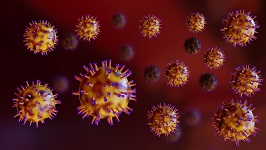
A new tool in cancer treatment is to get cancer cells to kill themselves and other tumor cells.
A huge benefit of this is that healthy cells remain unharmed, sparing patients from the terrible side effects of traditional cancer treatments.
In the newest study, scientists created a technology called SHREAD which stands for shielded retargeted adenovirus. They created SHREAD viruses that specifically target cancer cells.
They engineer these viruses to specifically bind to cancer cells and deliver the information to produce therapeutics. The infected cells then make the therapeutics at much higher levels in the tumor than intravenously delivered drugs can achieve.
In this study the SHREAD viruses carried DNA that could make an approved breast cancer drug, trastuzumab. The engineered viruses were injected into mice with human breast cancer.
Ninety four percent of the time, the viruses infected tumor cells. And those cells began making the drug and killing off tumors. The amount of trastuzumab inside the tumors were 1800 times higher than in mice with tumors that got injections of the drug.
Researchers saw with sophisticated imaging, the SHREAD treatment damaged tumor blood vessels and killed cancer cells all within the tumor itself.
Plus, SHREAD's direct delivery technology overcomes the inefficient process of drug intravenous delivery and reduces side effects. If this option becomes available, it'll not only be more effective but also less expensive.
You can now hear additional episodes on many of your favorite podcast providers - visit Buzzsprout to subscribe.
More Information
Trojan Horse virus eliminates cancerous tumors from the inside out
A new technology developed by UZH researchers enables the body to produce therapeutic agents on demand at the exact location where they are needed. The innovation could reduce the side effects of cancer therapy and may hold the solution to better delivery of Covid-related therapies directly to the lungs...
The SHREAD gene therapy platform for paracrine delivery improves tumor localization and intratumoral effects of a clinical antibody
A challenge in cancer therapy is delivering high, consistent levels of therapeutics to tumors. Protein-based therapeutics (e.g., antibodies) are typically delivered intravenously and require multiple doses to get sufficient levels to traffic into tumors to exert an effect. Yet healthy tissues are also exposed to similar drug levels, which can lead to significant side effects. This study uses sophisticated three-dimensional imaging of transparent tumors to characterize a versatile gene therapy platform using adenovirus that solves this problem by producing drugs directly in the tumor. This approach increases the tumor-to-bloodstream level of a model antibody 1,800-fold in comparison to direct administration. Thus, this system could allow for the local production of highly potent drugs with greatly reduced risk of systemic toxicities...
Adenovirus Vectors for Gene Therapy, Vaccination and Cancer Gene Therapy
Adenovirus vectors are the most commonly employed vector for cancer gene therapy. They are also used for gene therapy and as vaccines to express foreign antigens. Adenovirus vectors can be replication-defective; certain essential viral genes are deleted and replaced by a cassette that expresses a foreign therapeutic gene. Such vectors are used for gene therapy, as vaccines, and for cancer therapy. Replication-competent (oncolytic) vectors are employed for cancer gene therapy. Oncolytic vectors are engineered to replicate preferentially in cancer cells and to destroy cancer cells through the natural process of lytic virus replication. Many clinical trials indicate that replication-defective and replication-competent adenovirus vectors are safe and have therapeutic activity...